Comparing Sleep Interventions: Hospitalized Patient Satisfaction
VerifiedAdded on 2024/04/29
|6
|1325
|388
Report
AI Summary
This report examines the issue of sleep deprivation among hospitalized patients and explores the effectiveness of different sleep interventions. It begins by establishing the clinical question of whether non-pharmacologic interventions are more effective than pharmacologic interventions in improving patient satisfaction and sleep quality. The research identifies randomized control trials as the best type of evidence to answer this question and outlines the search strategy used to find relevant articles in databases like Google Scholar, Jstor, and PubMed. The search process involved refining initial search terms and applying filters to focus on recent, peer-reviewed articles. Two key articles were selected: one comparing sleep quality in multi-occupancy versus single-patient rooms, and another analyzing the effect of earplugs and eye masks on post-abdominal surgery sleep quality. The report concludes that these articles provide valuable insights for comparing pharmacologic and non-pharmacologic sleep intervention measures and addressing the research question.
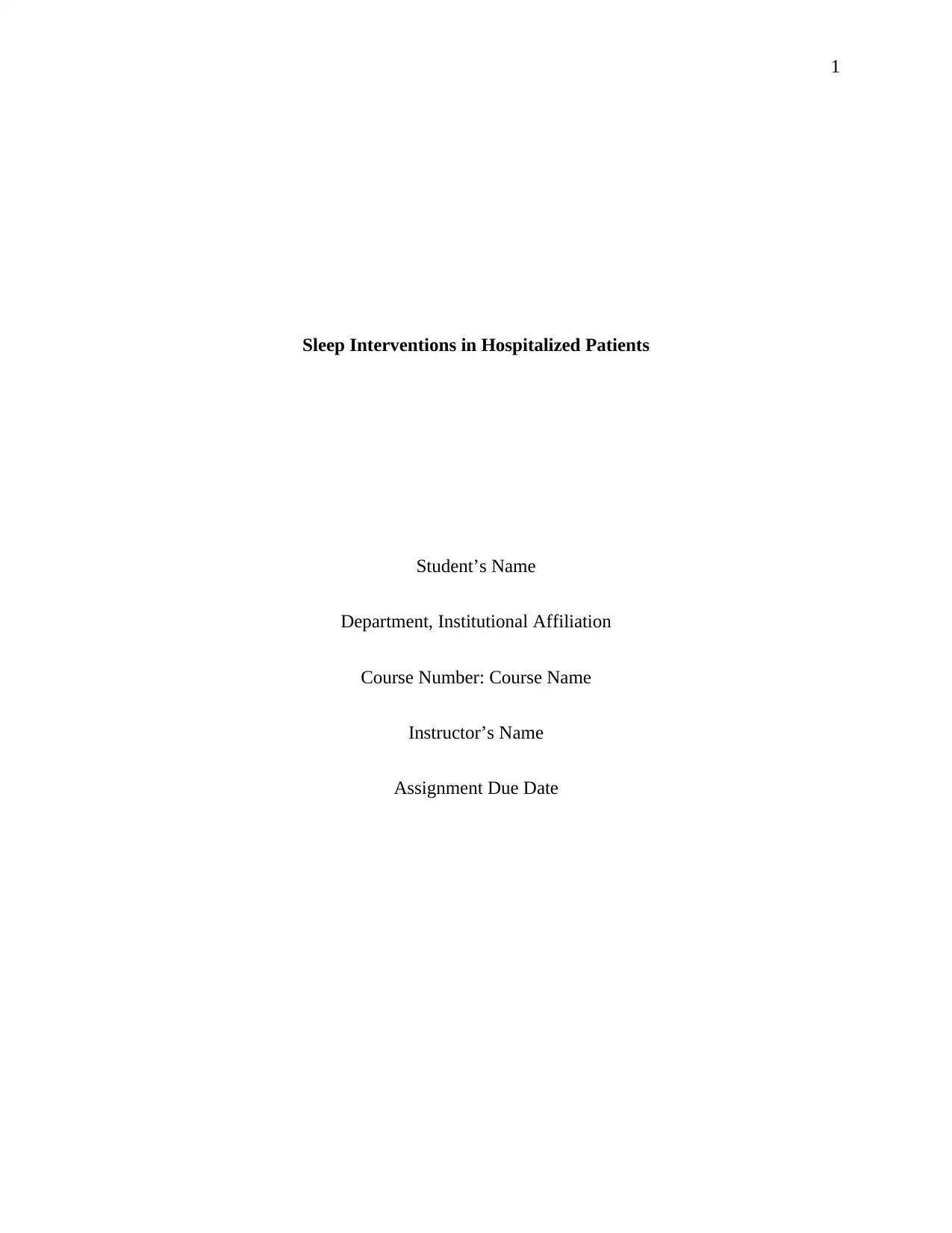
1
Sleep Interventions in Hospitalized Patients
Student’s Name
Department, Institutional Affiliation
Course Number: Course Name
Instructor’s Name
Assignment Due Date
Sleep Interventions in Hospitalized Patients
Student’s Name
Department, Institutional Affiliation
Course Number: Course Name
Instructor’s Name
Assignment Due Date
Paraphrase This Document
Need a fresh take? Get an instant paraphrase of this document with our AI Paraphraser
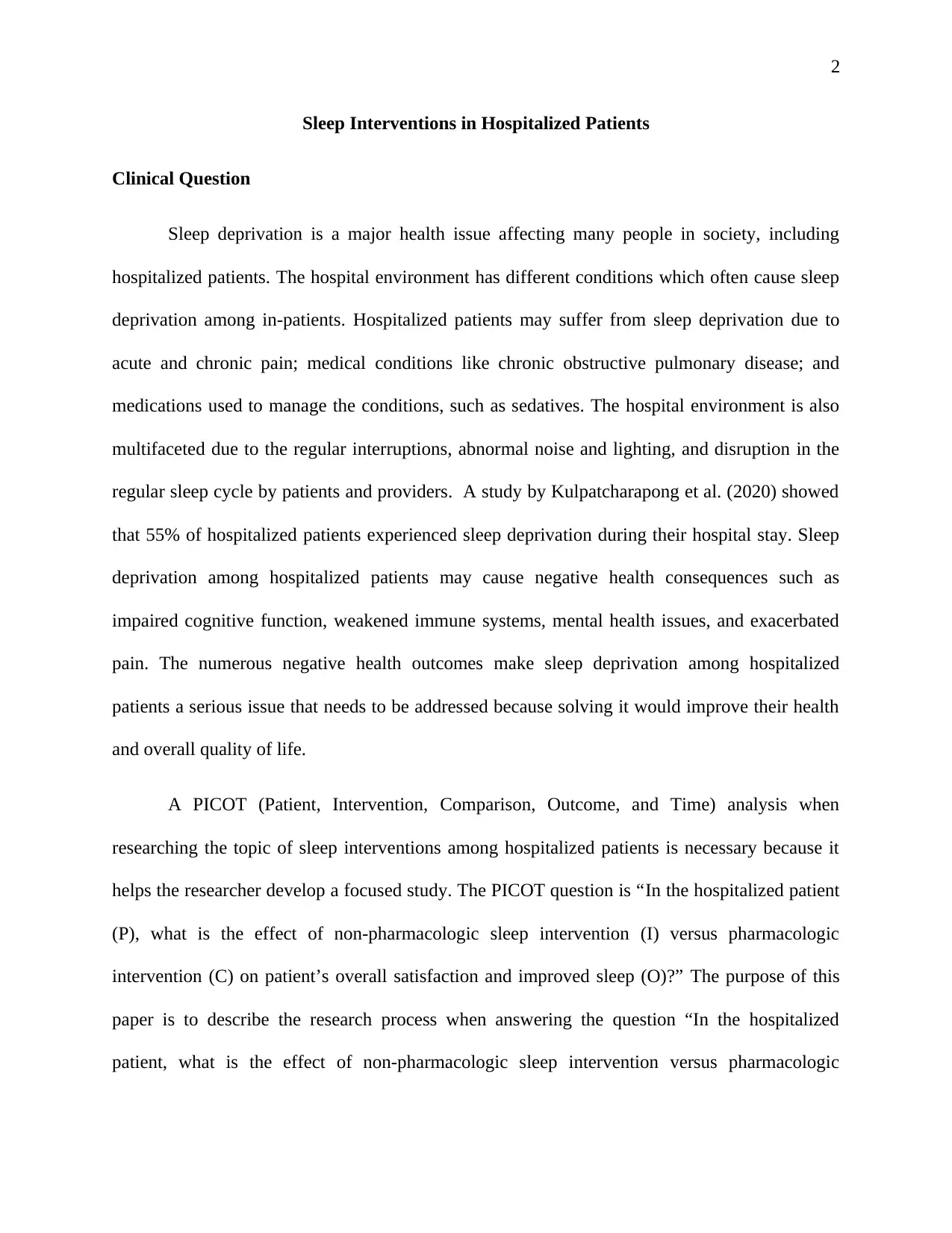
2
Sleep Interventions in Hospitalized Patients
Clinical Question
Sleep deprivation is a major health issue affecting many people in society, including
hospitalized patients. The hospital environment has different conditions which often cause sleep
deprivation among in-patients. Hospitalized patients may suffer from sleep deprivation due to
acute and chronic pain; medical conditions like chronic obstructive pulmonary disease; and
medications used to manage the conditions, such as sedatives. The hospital environment is also
multifaceted due to the regular interruptions, abnormal noise and lighting, and disruption in the
regular sleep cycle by patients and providers. A study by Kulpatcharapong et al. (2020) showed
that 55% of hospitalized patients experienced sleep deprivation during their hospital stay. Sleep
deprivation among hospitalized patients may cause negative health consequences such as
impaired cognitive function, weakened immune systems, mental health issues, and exacerbated
pain. The numerous negative health outcomes make sleep deprivation among hospitalized
patients a serious issue that needs to be addressed because solving it would improve their health
and overall quality of life.
A PICOT (Patient, Intervention, Comparison, Outcome, and Time) analysis when
researching the topic of sleep interventions among hospitalized patients is necessary because it
helps the researcher develop a focused study. The PICOT question is “In the hospitalized patient
(P), what is the effect of non-pharmacologic sleep intervention (I) versus pharmacologic
intervention (C) on patient’s overall satisfaction and improved sleep (O)?” The purpose of this
paper is to describe the research process when answering the question “In the hospitalized
patient, what is the effect of non-pharmacologic sleep intervention versus pharmacologic
Sleep Interventions in Hospitalized Patients
Clinical Question
Sleep deprivation is a major health issue affecting many people in society, including
hospitalized patients. The hospital environment has different conditions which often cause sleep
deprivation among in-patients. Hospitalized patients may suffer from sleep deprivation due to
acute and chronic pain; medical conditions like chronic obstructive pulmonary disease; and
medications used to manage the conditions, such as sedatives. The hospital environment is also
multifaceted due to the regular interruptions, abnormal noise and lighting, and disruption in the
regular sleep cycle by patients and providers. A study by Kulpatcharapong et al. (2020) showed
that 55% of hospitalized patients experienced sleep deprivation during their hospital stay. Sleep
deprivation among hospitalized patients may cause negative health consequences such as
impaired cognitive function, weakened immune systems, mental health issues, and exacerbated
pain. The numerous negative health outcomes make sleep deprivation among hospitalized
patients a serious issue that needs to be addressed because solving it would improve their health
and overall quality of life.
A PICOT (Patient, Intervention, Comparison, Outcome, and Time) analysis when
researching the topic of sleep interventions among hospitalized patients is necessary because it
helps the researcher develop a focused study. The PICOT question is “In the hospitalized patient
(P), what is the effect of non-pharmacologic sleep intervention (I) versus pharmacologic
intervention (C) on patient’s overall satisfaction and improved sleep (O)?” The purpose of this
paper is to describe the research process when answering the question “In the hospitalized
patient, what is the effect of non-pharmacologic sleep intervention versus pharmacologic
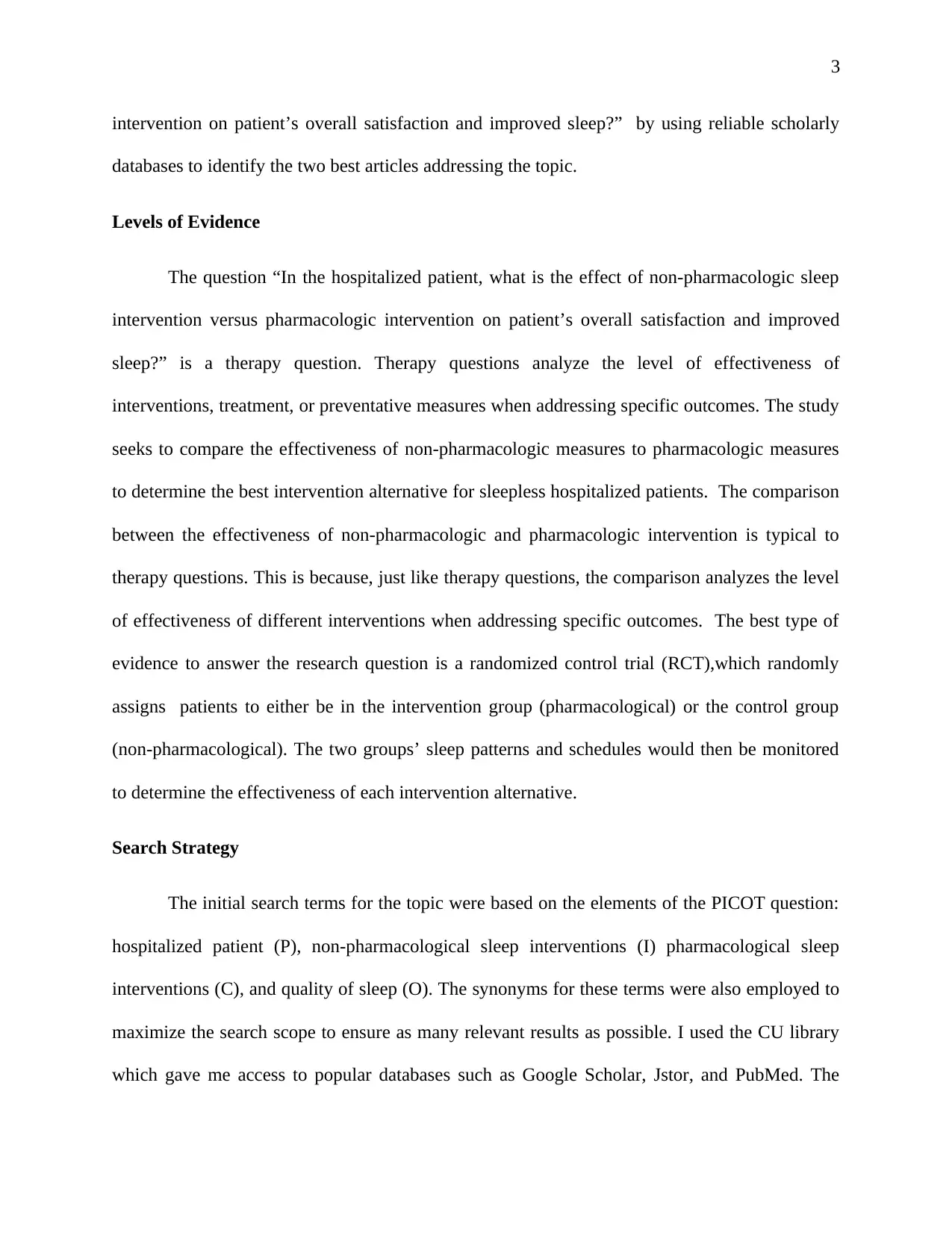
3
intervention on patient’s overall satisfaction and improved sleep?” by using reliable scholarly
databases to identify the two best articles addressing the topic.
Levels of Evidence
The question “In the hospitalized patient, what is the effect of non-pharmacologic sleep
intervention versus pharmacologic intervention on patient’s overall satisfaction and improved
sleep?” is a therapy question. Therapy questions analyze the level of effectiveness of
interventions, treatment, or preventative measures when addressing specific outcomes. The study
seeks to compare the effectiveness of non-pharmacologic measures to pharmacologic measures
to determine the best intervention alternative for sleepless hospitalized patients. The comparison
between the effectiveness of non-pharmacologic and pharmacologic intervention is typical to
therapy questions. This is because, just like therapy questions, the comparison analyzes the level
of effectiveness of different interventions when addressing specific outcomes. The best type of
evidence to answer the research question is a randomized control trial (RCT),which randomly
assigns patients to either be in the intervention group (pharmacological) or the control group
(non-pharmacological). The two groups’ sleep patterns and schedules would then be monitored
to determine the effectiveness of each intervention alternative.
Search Strategy
The initial search terms for the topic were based on the elements of the PICOT question:
hospitalized patient (P), non-pharmacological sleep interventions (I) pharmacological sleep
interventions (C), and quality of sleep (O). The synonyms for these terms were also employed to
maximize the search scope to ensure as many relevant results as possible. I used the CU library
which gave me access to popular databases such as Google Scholar, Jstor, and PubMed. The
intervention on patient’s overall satisfaction and improved sleep?” by using reliable scholarly
databases to identify the two best articles addressing the topic.
Levels of Evidence
The question “In the hospitalized patient, what is the effect of non-pharmacologic sleep
intervention versus pharmacologic intervention on patient’s overall satisfaction and improved
sleep?” is a therapy question. Therapy questions analyze the level of effectiveness of
interventions, treatment, or preventative measures when addressing specific outcomes. The study
seeks to compare the effectiveness of non-pharmacologic measures to pharmacologic measures
to determine the best intervention alternative for sleepless hospitalized patients. The comparison
between the effectiveness of non-pharmacologic and pharmacologic intervention is typical to
therapy questions. This is because, just like therapy questions, the comparison analyzes the level
of effectiveness of different interventions when addressing specific outcomes. The best type of
evidence to answer the research question is a randomized control trial (RCT),which randomly
assigns patients to either be in the intervention group (pharmacological) or the control group
(non-pharmacological). The two groups’ sleep patterns and schedules would then be monitored
to determine the effectiveness of each intervention alternative.
Search Strategy
The initial search terms for the topic were based on the elements of the PICOT question:
hospitalized patient (P), non-pharmacological sleep interventions (I) pharmacological sleep
interventions (C), and quality of sleep (O). The synonyms for these terms were also employed to
maximize the search scope to ensure as many relevant results as possible. I used the CU library
which gave me access to popular databases such as Google Scholar, Jstor, and PubMed. The
⊘ This is a preview!⊘
Do you want full access?
Subscribe today to unlock all pages.

Trusted by 1+ million students worldwide
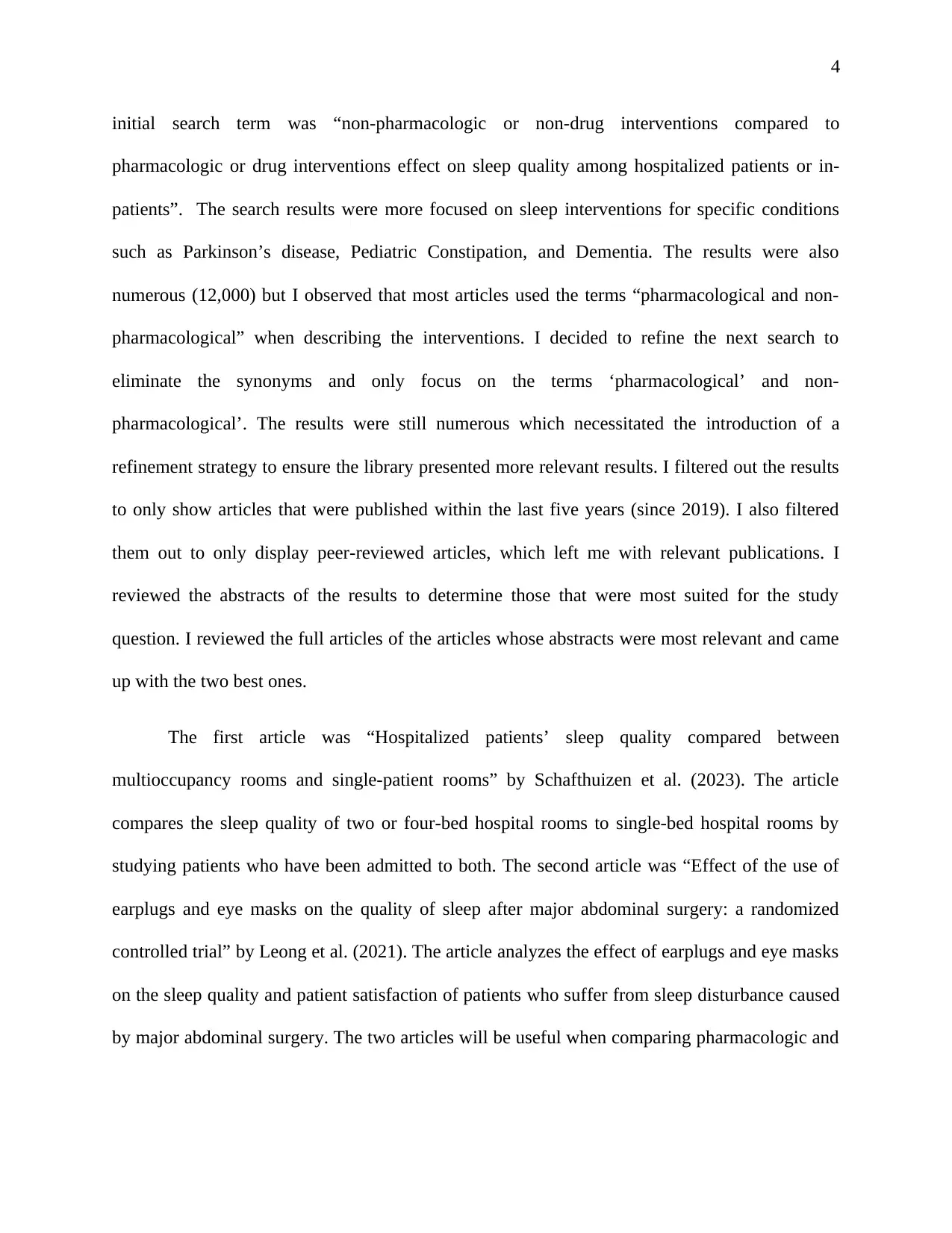
4
initial search term was “non-pharmacologic or non-drug interventions compared to
pharmacologic or drug interventions effect on sleep quality among hospitalized patients or in-
patients”. The search results were more focused on sleep interventions for specific conditions
such as Parkinson’s disease, Pediatric Constipation, and Dementia. The results were also
numerous (12,000) but I observed that most articles used the terms “pharmacological and non-
pharmacological” when describing the interventions. I decided to refine the next search to
eliminate the synonyms and only focus on the terms ‘pharmacological’ and non-
pharmacological’. The results were still numerous which necessitated the introduction of a
refinement strategy to ensure the library presented more relevant results. I filtered out the results
to only show articles that were published within the last five years (since 2019). I also filtered
them out to only display peer-reviewed articles, which left me with relevant publications. I
reviewed the abstracts of the results to determine those that were most suited for the study
question. I reviewed the full articles of the articles whose abstracts were most relevant and came
up with the two best ones.
The first article was “Hospitalized patients’ sleep quality compared between
multioccupancy rooms and single-patient rooms” by Schafthuizen et al. (2023). The article
compares the sleep quality of two or four-bed hospital rooms to single-bed hospital rooms by
studying patients who have been admitted to both. The second article was “Effect of the use of
earplugs and eye masks on the quality of sleep after major abdominal surgery: a randomized
controlled trial” by Leong et al. (2021). The article analyzes the effect of earplugs and eye masks
on the sleep quality and patient satisfaction of patients who suffer from sleep disturbance caused
by major abdominal surgery. The two articles will be useful when comparing pharmacologic and
initial search term was “non-pharmacologic or non-drug interventions compared to
pharmacologic or drug interventions effect on sleep quality among hospitalized patients or in-
patients”. The search results were more focused on sleep interventions for specific conditions
such as Parkinson’s disease, Pediatric Constipation, and Dementia. The results were also
numerous (12,000) but I observed that most articles used the terms “pharmacological and non-
pharmacological” when describing the interventions. I decided to refine the next search to
eliminate the synonyms and only focus on the terms ‘pharmacological’ and non-
pharmacological’. The results were still numerous which necessitated the introduction of a
refinement strategy to ensure the library presented more relevant results. I filtered out the results
to only show articles that were published within the last five years (since 2019). I also filtered
them out to only display peer-reviewed articles, which left me with relevant publications. I
reviewed the abstracts of the results to determine those that were most suited for the study
question. I reviewed the full articles of the articles whose abstracts were most relevant and came
up with the two best ones.
The first article was “Hospitalized patients’ sleep quality compared between
multioccupancy rooms and single-patient rooms” by Schafthuizen et al. (2023). The article
compares the sleep quality of two or four-bed hospital rooms to single-bed hospital rooms by
studying patients who have been admitted to both. The second article was “Effect of the use of
earplugs and eye masks on the quality of sleep after major abdominal surgery: a randomized
controlled trial” by Leong et al. (2021). The article analyzes the effect of earplugs and eye masks
on the sleep quality and patient satisfaction of patients who suffer from sleep disturbance caused
by major abdominal surgery. The two articles will be useful when comparing pharmacologic and
Paraphrase This Document
Need a fresh take? Get an instant paraphrase of this document with our AI Paraphraser
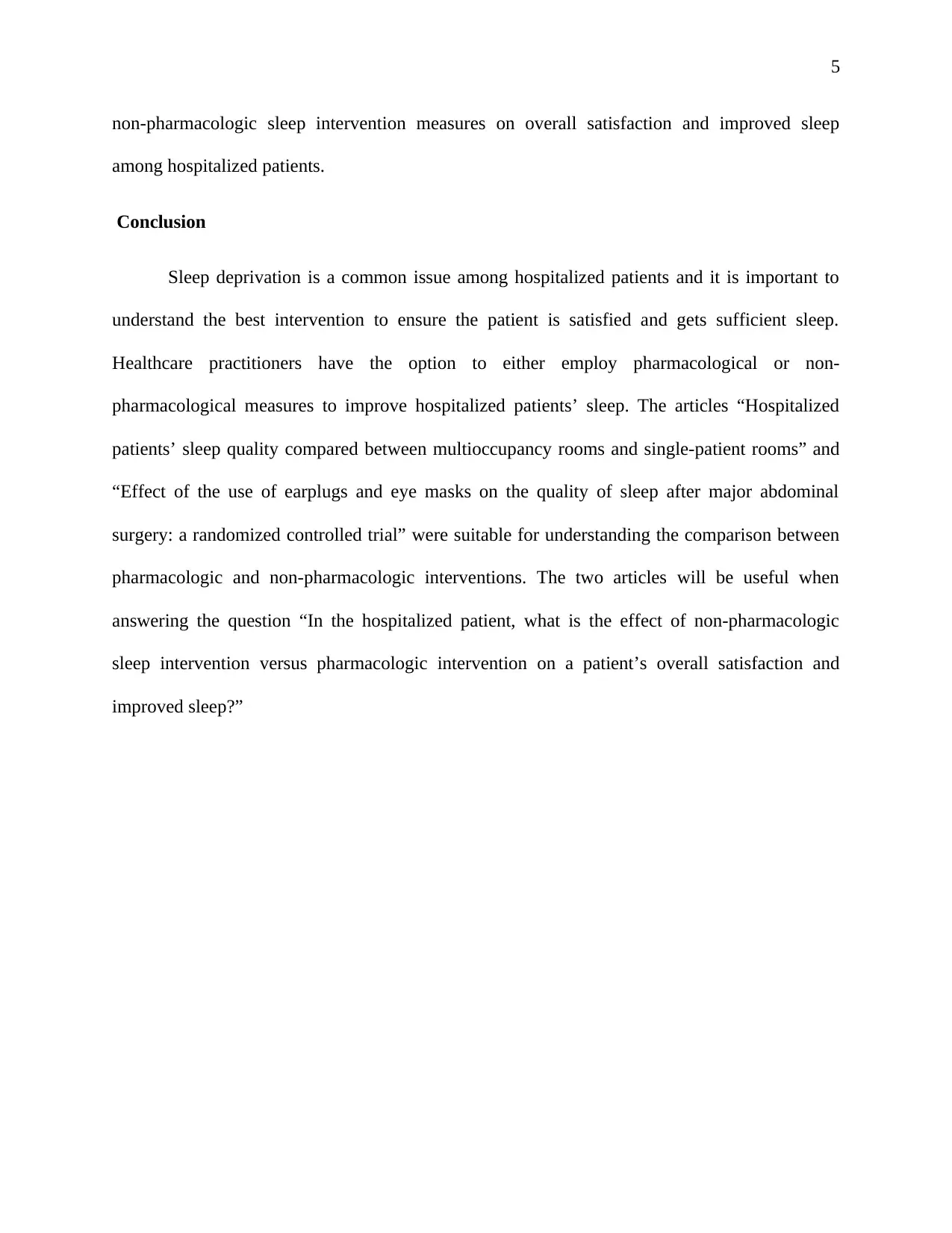
5
non-pharmacologic sleep intervention measures on overall satisfaction and improved sleep
among hospitalized patients.
Conclusion
Sleep deprivation is a common issue among hospitalized patients and it is important to
understand the best intervention to ensure the patient is satisfied and gets sufficient sleep.
Healthcare practitioners have the option to either employ pharmacological or non-
pharmacological measures to improve hospitalized patients’ sleep. The articles “Hospitalized
patients’ sleep quality compared between multioccupancy rooms and single-patient rooms” and
“Effect of the use of earplugs and eye masks on the quality of sleep after major abdominal
surgery: a randomized controlled trial” were suitable for understanding the comparison between
pharmacologic and non-pharmacologic interventions. The two articles will be useful when
answering the question “In the hospitalized patient, what is the effect of non-pharmacologic
sleep intervention versus pharmacologic intervention on a patient’s overall satisfaction and
improved sleep?”
non-pharmacologic sleep intervention measures on overall satisfaction and improved sleep
among hospitalized patients.
Conclusion
Sleep deprivation is a common issue among hospitalized patients and it is important to
understand the best intervention to ensure the patient is satisfied and gets sufficient sleep.
Healthcare practitioners have the option to either employ pharmacological or non-
pharmacological measures to improve hospitalized patients’ sleep. The articles “Hospitalized
patients’ sleep quality compared between multioccupancy rooms and single-patient rooms” and
“Effect of the use of earplugs and eye masks on the quality of sleep after major abdominal
surgery: a randomized controlled trial” were suitable for understanding the comparison between
pharmacologic and non-pharmacologic interventions. The two articles will be useful when
answering the question “In the hospitalized patient, what is the effect of non-pharmacologic
sleep intervention versus pharmacologic intervention on a patient’s overall satisfaction and
improved sleep?”
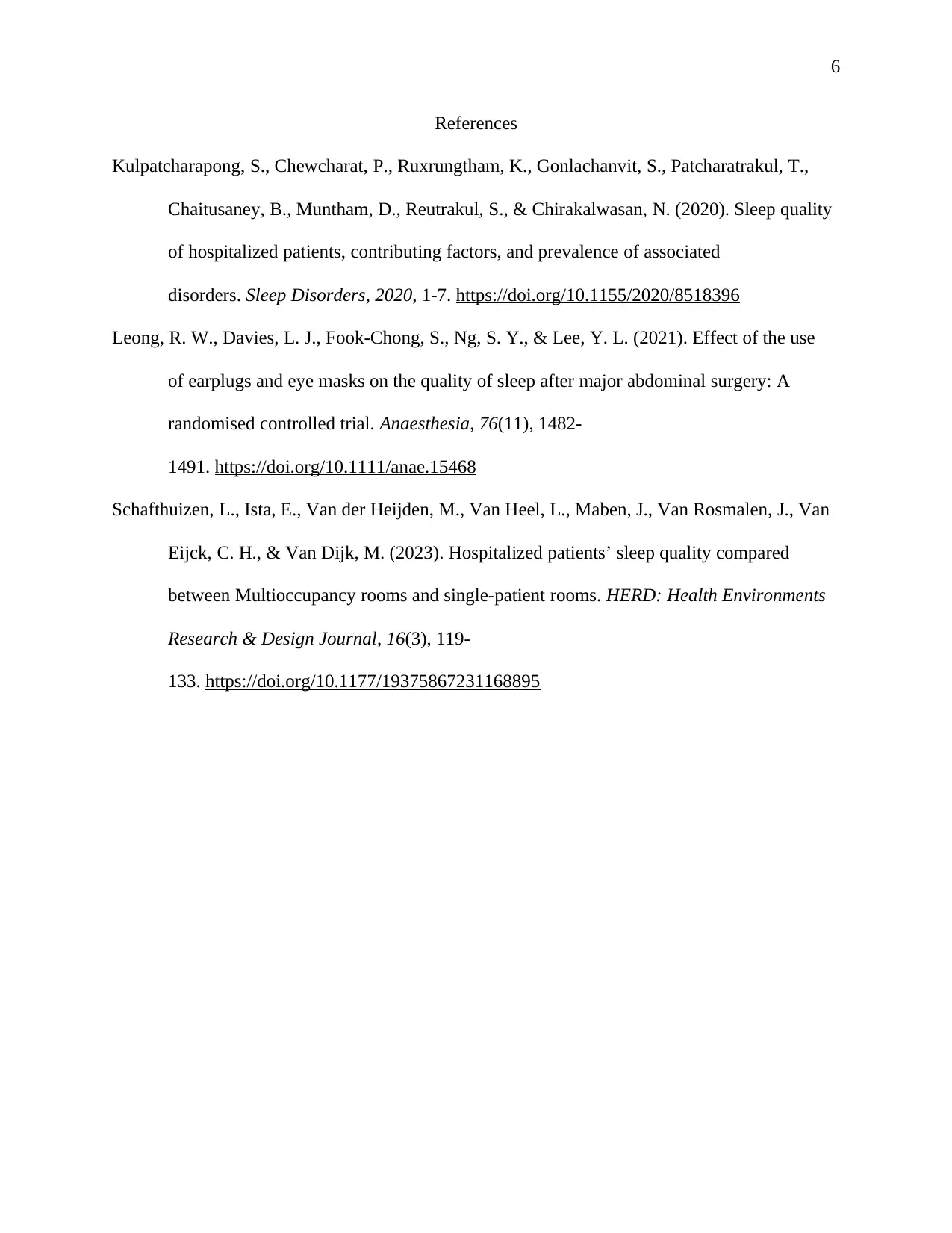
6
References
Kulpatcharapong, S., Chewcharat, P., Ruxrungtham, K., Gonlachanvit, S., Patcharatrakul, T.,
Chaitusaney, B., Muntham, D., Reutrakul, S., & Chirakalwasan, N. (2020). Sleep quality
of hospitalized patients, contributing factors, and prevalence of associated
disorders. Sleep Disorders, 2020, 1-7. https://doi.org/10.1155/2020/8518396
Leong, R. W., Davies, L. J., Fook‐Chong, S., Ng, S. Y., & Lee, Y. L. (2021). Effect of the use
of earplugs and eye masks on the quality of sleep after major abdominal surgery: A
randomised controlled trial. Anaesthesia, 76(11), 1482-
1491. https://doi.org/10.1111/anae.15468
Schafthuizen, L., Ista, E., Van der Heijden, M., Van Heel, L., Maben, J., Van Rosmalen, J., Van
Eijck, C. H., & Van Dijk, M. (2023). Hospitalized patients’ sleep quality compared
between Multioccupancy rooms and single-patient rooms. HERD: Health Environments
Research & Design Journal, 16(3), 119-
133. https://doi.org/10.1177/19375867231168895
References
Kulpatcharapong, S., Chewcharat, P., Ruxrungtham, K., Gonlachanvit, S., Patcharatrakul, T.,
Chaitusaney, B., Muntham, D., Reutrakul, S., & Chirakalwasan, N. (2020). Sleep quality
of hospitalized patients, contributing factors, and prevalence of associated
disorders. Sleep Disorders, 2020, 1-7. https://doi.org/10.1155/2020/8518396
Leong, R. W., Davies, L. J., Fook‐Chong, S., Ng, S. Y., & Lee, Y. L. (2021). Effect of the use
of earplugs and eye masks on the quality of sleep after major abdominal surgery: A
randomised controlled trial. Anaesthesia, 76(11), 1482-
1491. https://doi.org/10.1111/anae.15468
Schafthuizen, L., Ista, E., Van der Heijden, M., Van Heel, L., Maben, J., Van Rosmalen, J., Van
Eijck, C. H., & Van Dijk, M. (2023). Hospitalized patients’ sleep quality compared
between Multioccupancy rooms and single-patient rooms. HERD: Health Environments
Research & Design Journal, 16(3), 119-
133. https://doi.org/10.1177/19375867231168895
⊘ This is a preview!⊘
Do you want full access?
Subscribe today to unlock all pages.

Trusted by 1+ million students worldwide
1 out of 6
Related Documents
Your All-in-One AI-Powered Toolkit for Academic Success.
+13062052269
info@desklib.com
Available 24*7 on WhatsApp / Email
![[object Object]](/_next/static/media/star-bottom.7253800d.svg)
Unlock your academic potential
Copyright © 2020–2026 A2Z Services. All Rights Reserved. Developed and managed by ZUCOL.




